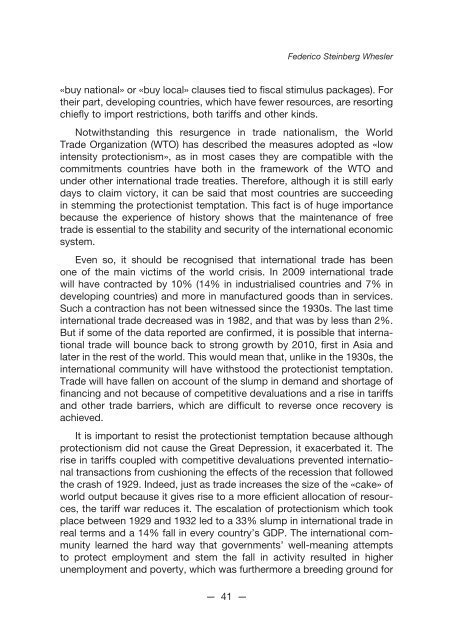Strategic Panorama 2009 - 2010 - IEEE
Strategic Panorama 2009 - 2010 - IEEE
Strategic Panorama 2009 - 2010 - IEEE
Create successful ePaper yourself
Turn your PDF publications into a flip-book with our unique Google optimized e-Paper software.
Federico Steinberg Whesler<br />
«buy national» or «buy local» clauses tied to fiscal stimulus packages). For<br />
their part, developing countries, which have fewer resources, are resorting<br />
chiefly to import restrictions, both tariffs and other kinds.<br />
Notwithstanding this resurgence in trade nationalism, the World<br />
Trade Organization (WTO) has described the measures adopted as «low<br />
intensity protectionism», as in most cases they are compatible with the<br />
commitments countries have both in the framework of the WTO and<br />
under other international trade treaties. Therefore, although it is still early<br />
days to claim victory, it can be said that most countries are succeeding<br />
in stemming the protectionist temptation. This fact is of huge importance<br />
because the experience of history shows that the maintenance of free<br />
trade is essential to the stability and security of the international economic<br />
system.<br />
Even so, it should be recognised that international trade has been<br />
one of the main victims of the world crisis. In <strong>2009</strong> international trade<br />
will have contracted by 10% (14% in industrialised countries and 7% in<br />
developing countries) and more in manufactured goods than in services.<br />
Such a contraction has not been witnessed since the 1930s. The last time<br />
international trade decreased was in 1982, and that was by less than 2%.<br />
But if some of the data reported are confirmed, it is possible that international<br />
trade will bounce back to strong growth by <strong>2010</strong>, first in Asia and<br />
later in the rest of the world. This would mean that, unlike in the 1930s, the<br />
international community will have withstood the protectionist temptation.<br />
Trade will have fallen on account of the slump in demand and shortage of<br />
financing and not because of competitive devaluations and a rise in tariffs<br />
and other trade barriers, which are difficult to reverse once recovery is<br />
achieved.<br />
It is important to resist the protectionist temptation because although<br />
protectionism did not cause the Great Depression, it exacerbated it. The<br />
rise in tariffs coupled with competitive devaluations prevented international<br />
transactions from cushioning the effects of the recession that followed<br />
the crash of 1929. Indeed, just as trade increases the size of the «cake» of<br />
world output because it gives rise to a more efficient allocation of resources,<br />
the tariff war reduces it. The escalation of protectionism which took<br />
place between 1929 and 1932 led to a 33% slump in international trade in<br />
real terms and a 14% fall in every country’s GDP. The international community<br />
learned the hard way that governments’ well-meaning attempts<br />
to protect employment and stem the fall in activity resulted in higher<br />
unemployment and poverty, which was furthermore a breeding ground for<br />
— 41 —

















